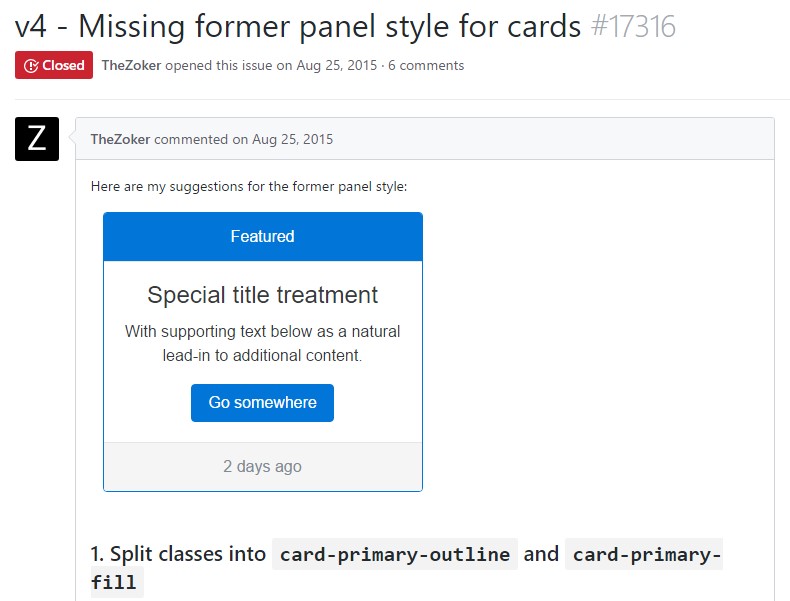Bootstrap Panel Body
Overview
Very often we need to split up a few short (or not so much) parts of content to make them stand up and get the person's attention-- like listing certain handy features presenting a selection of articles with a small abstract and a solitary strong image and so on and on.
We require a handy instrument to wonderfully wrap our web content in a lovely and responsive approach to get it wonderful and neat shown on our web pages. In the latest version of the remarkably well-known flexible framework-- Bootstrap 3 we employed mostly the Bootstrap Panel Button, thumbnail and well elements giving us box containers having a faint border, slightly elliptical corners and eventually-- a slight 3d effect. In the latest Bootstrap 4 framework, these are no longer. They get got changed entirely by the card section claiming to be capable of nearly whatever the previous features can do but simply improved. So it's time to get to learn it better.
Approaches to employ the Bootstrap Panel Example:
The cards are lightly styled containers capable of holding practically any HTML content within in addition featuring a lot of predefined styling choice for correctly showing its content. It in addition optionally might have a footer and a header.
To create a card we first need a .card component to wrap the entire thing up. Inside it distinct wrappers for the header .card-header, the genuine card content .card-block and the footer .card-footer should take place and while the header and footer are quite optional and may be left out if you don't need them the .card-block is the necessary component-- it perfectly wraps your content supplying some slight padding near.
The contextual color classes can be used to additionally design your complete card sections easily-- simply assign a .card- ~ one of the contextual colours here like primary, success, info or danger here ~ to the primary .card wrapper and in case the background gets a bit too darkened for the content to be readable enough-- additionally add the .card-inverse class to alter the text color. You can also design only the boundary color tone using the contextual scheme-- this gets done by assigning the .card-outline- ~ the needed shade ~ class again to the major .card element.
As discussed before the .card-block appears to cover the content remaining a notable padding around it. The moment it gets to pics this might want to avoid this and get the pic stretched the entire width of the section.
To get this look just put the <div class="img"><img></div> tag outside the .card-block thus you prevent the paddings eventually adding style=" width:100%;" to make sure this is going to resize properly always filling in its container.
There are some pretty useful alignment classes as well like .card-img-top and .card-img-bottom aligning the pic at the top or the bottom of the card. And if you wish to position it somewhere in between the text just break the .card-block, insert the image and start a new .card-block to put the content you want placed after the pic-- numerous card blocks are supported. Eventually you might also want to include some message over the image-- wrap it inside a <div> holding the .img-overlay class.
Some words about the layout-- cards will occupy the entire horizontal area available by default thus it's a smart idea restricting it by putting them in some grid elements. By doing this you can obtain their expected actions.
Some example
Cards are designed with as minimal markup and styles as possible, but still handle to present a lot of regulation and customization. Built with flexbox, they offer easy alignment and blend properly with other Bootstrap elements.
Below is an example of a simple card with different content and a specified width. Cards have no preset width to start, so they'll typically occupy the full width of its parent element. This is effortlessly customized with several sizing possibilities.
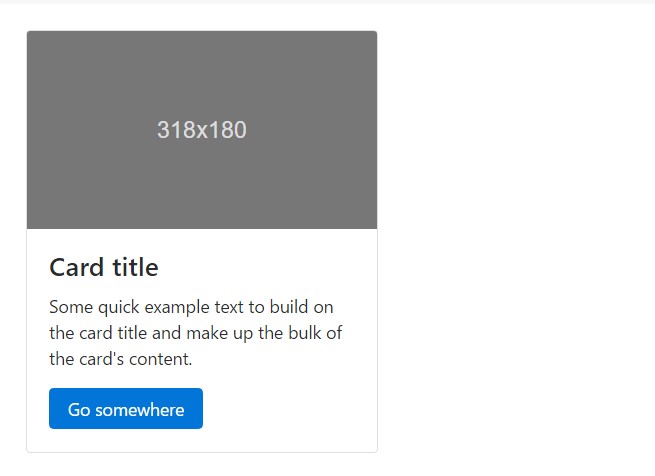
<div class="card" style="width: 20rem;">
<div class="img"><img class="card-img-top" src="..." alt="Card picture caption"></div>
<div class="card-block">
<h4 class="card-title">Card caption</h4>
<p class="card-text">Some fast sample message to build on the card title as well as compose the bulk of the card's material.</p>
<a href="#" class="btn btn-primary">Go somewhere</a>
</div>
</div>Web-site material sorts
Cards maintain a large range of content, involving pictures, text, list collections, hyperlinks, and more. Listed below are examples of what's provided.
Blocks
The building block of a card is the .card-block. Use it when you demand a padded section in a card.

<div class="card">
<div class="card-block">
This is some message in a card block.
</div>
</div>Titles, information, and urls
Card titles are used by including .card-title to a <h*> tag. Similarly, links are added and installed near each other by adding .card-link to a <a> tag. Subtitles are used by putting a .card-subtitle to a <h*> tag. If the .card-title and the .card-subtitle elements are put in a .card-block element, the card title and subtitle are positioned nicely.

<div class="card">
<div class="card-block">
<h4 class="card-title">Card title</h4>
<h6 class="card-subtitle mb-2 text-muted">Card subtitle</h6>
<p class="card-text">Some fast example message to improve the card title and compose the mass of the card's content.</p>
<a href="#" class="card-link">Card link</a>
<a href="#" class="card-link">Another link</a>
</div>
</div>Pictures
.card-img-top places a picture to the very top of the card. With .card-text, text may be added to the card. Text inside .card-text can also be styled with the regular HTML tags.
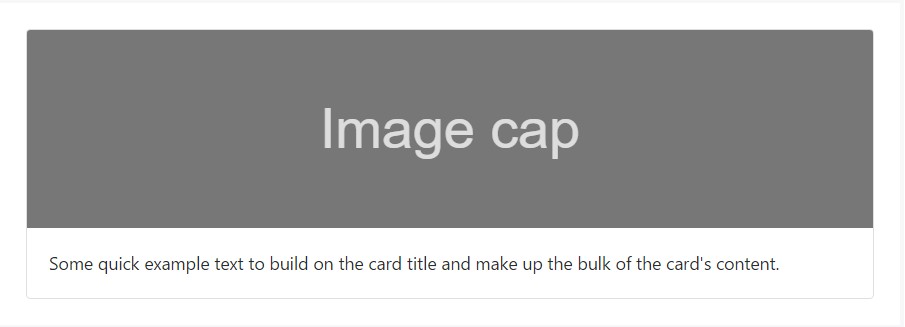
<div class="card">
<div class="img"><img class="card-img-top" src="..." alt="Card picture cap"></div>
<div class="card-block">
<p class="card-text">Some fast example message to build on the card title and also compose the bulk of the card's web content.</p>
</div>
</div>Selection groups
Generate lists of content in a card by a flush list group.

<div class="card">
<ul class="list-group list-group-flush">
<li class="list-group-item">Cras justo odio</li>
<li class="list-group-item">Dapibus ac facilisis in</li>
<li class="list-group-item">Vestibulum at eros</li>
</ul>
</div>Mix up and match several material kinds to generate the card you desire, or throw everything in there. Shown right here are picture formats, blocks, text message looks, plus a list group - all covered in a fixed-width card.

<div class="card" style="width: 20rem;">
<div class="img"><img class="card-img-top" src="..." alt="Card image cap"></div>
<div class="card-block">
<h4 class="card-title">Card title</h4>
<p class="card-text">Some quick example text to build on the card title and make up the bulk of the card's content.</p>
</div>
<ul class="list-group list-group-flush">
<li class="list-group-item">Cras justo odio</li>
<li class="list-group-item">Dapibus ac facilisis in</li>
<li class="list-group-item">Vestibulum at eros</li>
</ul>
<div class="card-block">
<a href="#" class="card-link">Card link</a>
<a href="#" class="card-link">Another link</a>
</div>
</div>Header and footer
Include an optional header and/or footer in a card.

<div class="card">
<div class="card-header">
Featured
</div>
<div class="card-block">
<h4 class="card-title">Unique title therapy</h4>
<p class="card-text">With supporting message below as an all-natural lead-in to extra content.</p>
<a href="#" class="btn btn-primary">Go someplace</a>
</div>
</div>Card headers can be styled by adding .card-header to <h*> elements.

<div class="card">
<h3 class="card-header">Featured</h3>
<div class="card-block">
<h4 class="card-title">Special title treatment</h4>
<p class="card-text">With supporting message below as a natural lead-in to extra content.</p>
<a href="#" class="btn btn-primary">Go someplace</a>
</div>
</div>
<div class="card">
<div class="card-header">
Quote
</div>
<div class="card-block">
<blockquote class="card-blockquote">
<p>Lorem ipsum dolor sit amet, consectetur adipiscing elit. Integer posuere erat a ante.</p>
<footer>Someone famous in <cite title="Source Title">Source Title</cite></footer>
</blockquote>
</div>
</div>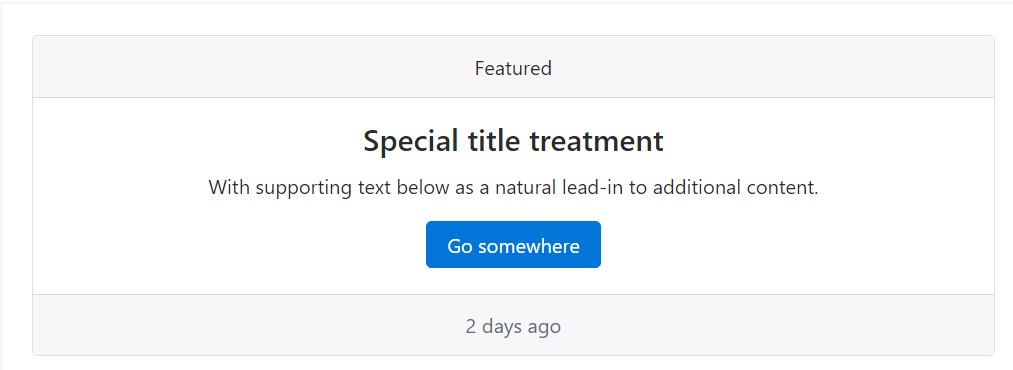
<div class="card text-center">
<div class="card-header">
Featured
</div>
<div class="card-block">
<h4 class="card-title">Special title treatment</h4>
<p class="card-text">With supporting text below as an all-natural lead-in to extra material.</p>
<a href="#" class="btn btn-primary">Go someplace</a>
</div>
<div class="card-footer text-muted">
2 days ago
</div>
</div>Scale
Cards assume no certain width to start, so they'll be 100% wide except otherwise stated. You can alter this as desired with custom CSS, grid classes, grid Sass mixins, or utilities.
Employing grid markup
Using the grid, wrap cards in columns and rows as desired.

<div class="row">
<div class="col-sm-6">
<div class="card">
<div class="card-block">
<h3 class="card-title">Special title treatment</h3>
<p class="card-text">With supporting text below as a natural lead-in to additional content.</p>
<a href="#" class="btn btn-primary">Go somewhere</a>
</div>
</div>
</div>
<div class="col-sm-6">
<div class="card">
<div class="card-block">
<h3 class="card-title">Special title treatment</h3>
<p class="card-text">With supporting text below as a natural lead-in to additional content.</p>
<a href="#" class="btn btn-primary">Go somewhere</a>
</div>
</div>
</div>
</div>Working with utilities
Use handful of available sizing utilities to rapidly set a card's width.
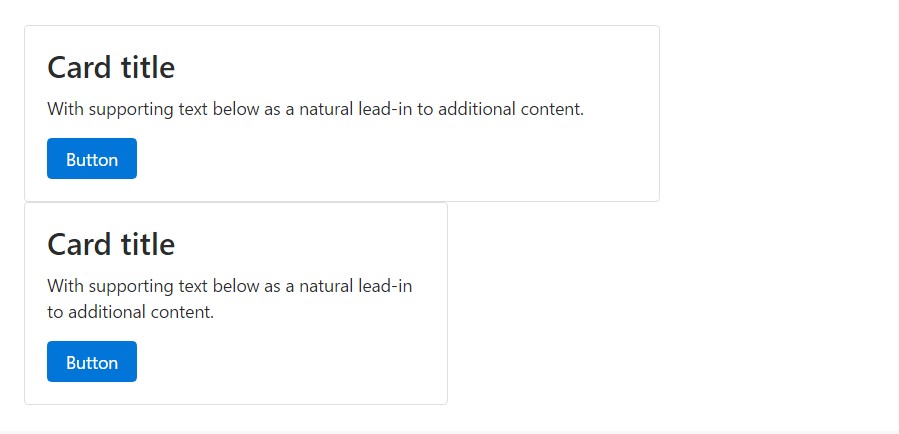
<div class="card w-75">
<div class="card-block">
<h3 class="card-title">Card title</h3>
<p class="card-text">With supporting text below as a natural lead-in to additional content.</p>
<a href="#" class="btn btn-primary">Button</a>
</div>
</div>
<div class="card w-50">
<div class="card-block">
<h3 class="card-title">Card title</h3>
<p class="card-text">With sustaining message listed below as an all-natural lead-in to extra web content.</p>
<a href="#" class="btn btn-primary">Button</a>
</div>
</div>
<div class="card" style="width: 20rem;">
<div class="card-block">
<h3 class="card-title">Special title treatment</h3>
<p class="card-text">With supporting text below as a natural lead-in to added material.</p>
<a href="#" class="btn btn-primary">Go somewhere</a>
</div>
</div>Text message placing
You could swiftly change the message placement of any type of card-- in its totality or particular components-- with text align classes.
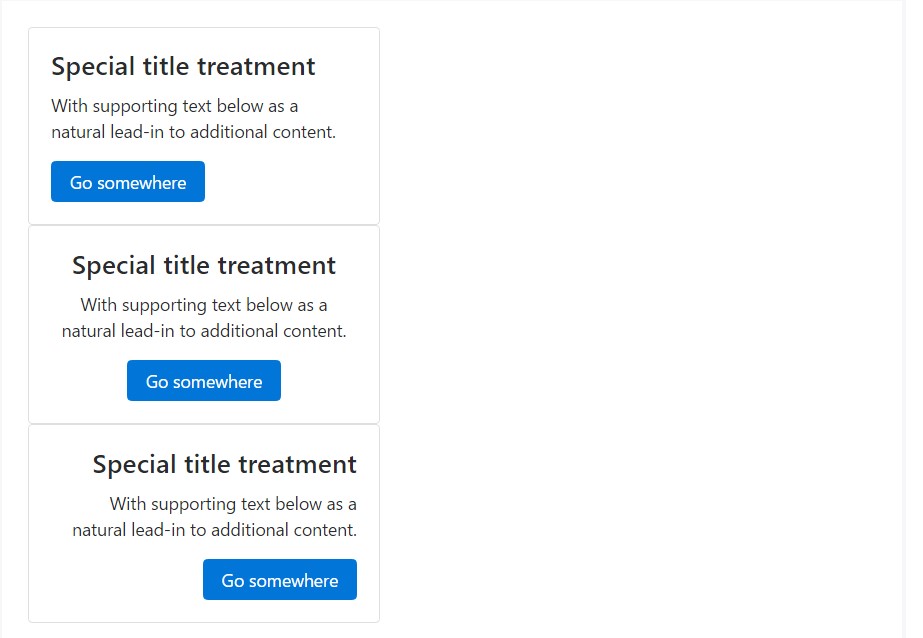
<div class="card" style="width: 20rem;">
<div class="card-block">
<h4 class="card-title">Special title treatment</h4>
<p class="card-text">With supporting text below as a natural lead-in to additional content.</p>
<a href="#" class="btn btn-primary">Go somewhere</a>
</div>
</div>
<div class="card text-center" style="width: 20rem;">
<div class="card-block">
<h4 class="card-title">Special title treatment</h4>
<p class="card-text">With supporting text below as a natural lead-in to additional content.</p>
<a href="#" class="btn btn-primary">Go somewhere</a>
</div>
</div>
<div class="card text-right" style="width: 20rem;">
<div class="card-block">
<h4 class="card-title">Special title treatment</h4>
<p class="card-text">With supporting text below as a natural lead-in to additional content.</p>
<a href="#" class="btn btn-primary">Go somewhere</a>
</div>
</div>Site navigating
Add some navigation to a card's header (or block) with Bootstrap's nav components.

<div class="card text-center">
<div class="card-header">
<ul class="nav nav-tabs card-header-tabs">
<li class="nav-item">
<a class="nav-link active" href="#">Active</a>
</li>
<li class="nav-item">
<a class="nav-link" href="#">Link</a>
</li>
<li class="nav-item">
<a class="nav-link disabled" href="#">Disabled</a>
</li>
</ul>
</div>
<div class="card-block">
<h4 class="card-title">Special title treatment</h4>
<p class="card-text">With supporting text below as a natural lead-in to additional content.</p>
<a href="#" class="btn btn-primary">Go somewhere</a>
</div>
</div>
<div class="card text-center">
<div class="card-header">
<ul class="nav nav-pills card-header-pills">
<li class="nav-item">
<a class="nav-link active" href="#">Active</a>
</li>
<li class="nav-item">
<a class="nav-link" href="#">Link</a>
</li>
<li class="nav-item">
<a class="nav-link disabled" href="#">Disabled</a>
</li>
</ul>
</div>
<div class="card-block">
<h4 class="card-title">Special title treatment</h4>
<p class="card-text">With supporting text below as a natural lead-in to additional content.</p>
<a href="#" class="btn btn-primary">Go somewhere</a>
</div>
</div>Images
Cards provide some possibilities for operating with images. Select from adding "image caps" at possibly end of a card, overlaying pictures with card content, or simply installing the image in a card.
Picture caps
Just like headers and footers, cards can include bottom and top "image caps"-- pictures at the top or bottom of a card.
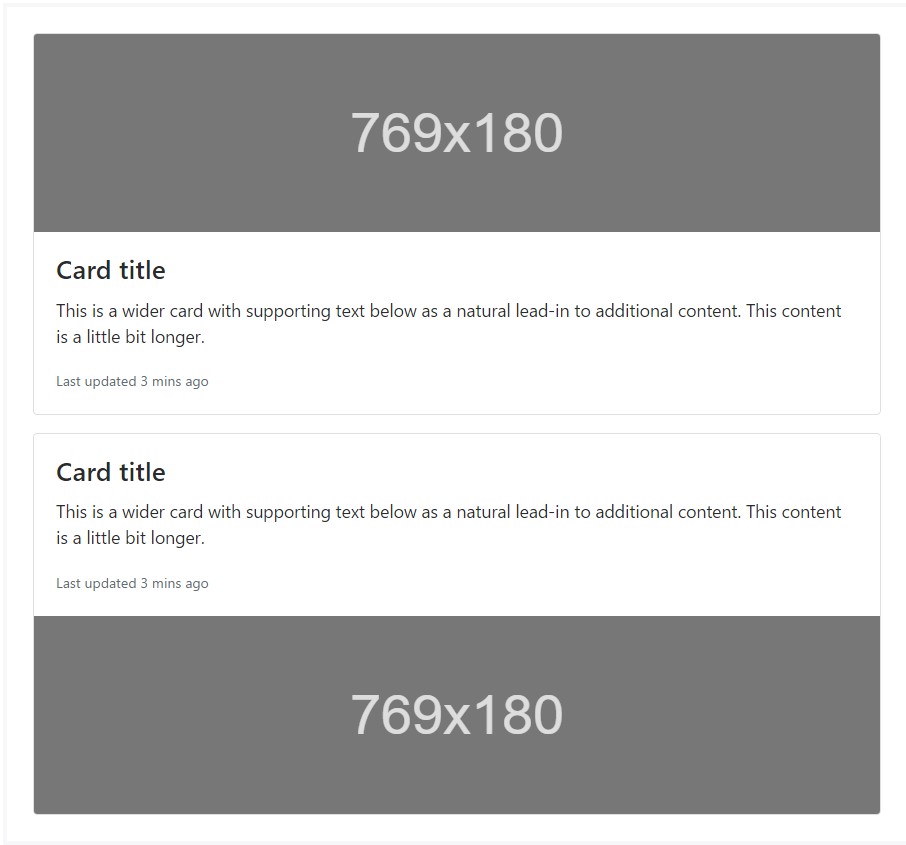
<div class="card mb-3">
<div class="img"><img class="card-img-top" src="..." alt="Card image cap"></div>
<div class="card-block">
<h4 class="card-title">Card title</h4>
<p class="card-text">This is a wider card with supporting text below as a natural lead-in to additional content. This content is a little bit longer.</p>
<p class="card-text"><small class="text-muted">Last updated 3 mins ago</small></p>
</div>
</div>
<div class="card">
<div class="card-block">
<h4 class="card-title">Card title</h4>
<p class="card-text">This is a wider card with supporting text below as a natural lead-in to additional content. This content is a little bit longer.</p>
<p class="card-text"><small class="text-muted">Last updated 3 mins ago</small></p>
</div>
<div class="img"><img class="card-img-bottom" src="..." alt="Card image cap"></div>
</div>Image cover
Turn a picture into a card background and overlay your card's text. Basing on the pic, you may or may not want .card-inverse (see below).
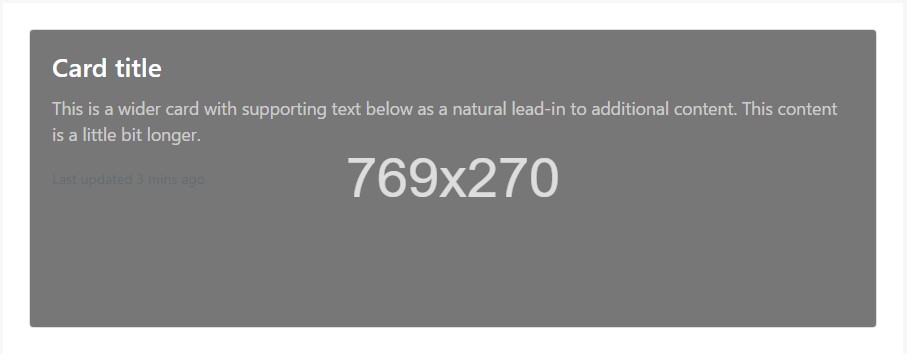
<div class="card card-inverse">
<div class="img"><img class="card-img" src="..." alt="Card image"></div>
<div class="card-img-overlay">
<h4 class="card-title">Card title</h4>
<p class="card-text">This is a wider card with supporting text below as a natural lead-in to additional content. This content is a little bit longer.</p>
<p class="card-text"><small class="text-muted">Last updated 3 mins ago</small></p>
</div>
</div>Card assortments
Cards provide different options for customizing their backgrounds, borders, and color.
Inverted message
By default, cards use dark text and expect a light background. You can reverse this by toggling the color scheme of text within, as well as that of the card's subcomponents, with .card-inverse. After that, specify a dark background-color and border-color to go with it.
You may additionally use .card-inverse having the contextual backgrounds versions.

<div class="card card-inverse" style="background-color: #333; border-color: #333;">
<div class="card-block">
<h3 class="card-title">Special title treatment</h3>
<p class="card-text">With supporting text below as a natural lead-in to additional content.</p>
<a href="#" class="btn btn-primary">Go somewhere</a>
</div>
</div>Background variants
Cards include their own variant classes for quickly altering the background-color and border-color of a card. Darker colors demand the use of .card-inverse.
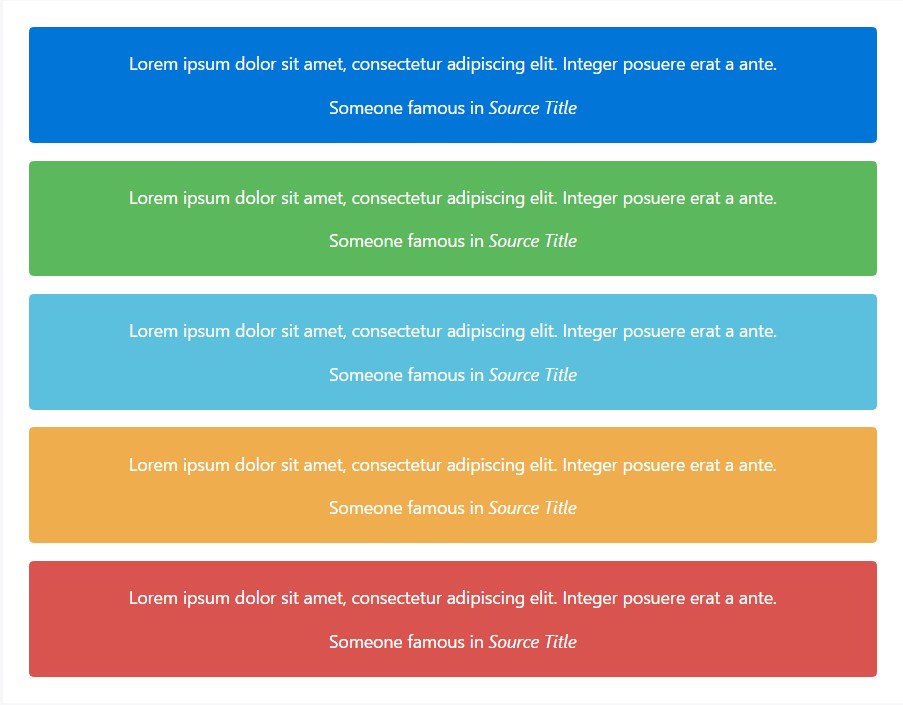
<div class="card card-inverse card-primary mb-3 text-center">
<div class="card-block">
<blockquote class="card-blockquote">
<p>Lorem ipsum dolor sit amet, consectetur adipiscing elit. Integer posuere erat a ante.</p>
<footer>Someone famous in <cite title="Source Title">Source Title</cite></footer>
</blockquote>
</div>
</div>
<div class="card card-inverse card-success mb-3 text-center">
<div class="card-block">
<blockquote class="card-blockquote">
<p>Lorem ipsum dolor sit amet, consectetur adipiscing elit. Integer posuere erat a ante.</p>
<footer>Someone famous in <cite title="Source Title">Source Title</cite></footer>
</blockquote>
</div>
</div>
<div class="card card-inverse card-info mb-3 text-center">
<div class="card-block">
<blockquote class="card-blockquote">
<p>Lorem ipsum dolor sit amet, consectetur adipiscing elit. Integer posuere erat a ante.</p>
<footer>Someone famous in <cite title="Source Title">Source Title</cite></footer>
</blockquote>
</div>
</div>
<div class="card card-inverse card-warning mb-3 text-center">
<div class="card-block">
<blockquote class="card-blockquote">
<p>Lorem ipsum dolor sit amet, consectetur adipiscing elit. Integer posuere erat a ante.</p>
<footer>Someone famous in <cite title="Source Title">Source Title</cite></footer>
</blockquote>
</div>
</div>
<div class="card card-inverse card-danger text-center">
<div class="card-block">
<blockquote class="card-blockquote">
<p>Lorem ipsum dolor sit amet, consectetur adipiscing elit. Integer posuere erat a ante.</p>
<footer>Someone famous in <cite title="Source Title">Source Title</cite></footer>
</blockquote>
</div>
</div>Showing meaning to assistive modern technologies
Employing color to include meaning only offers a visual indication, that will not be conveyed to users of assistive technologies-- like screen readers. Make sure that info denoted by the color is either evident from the material itself (e.g. the visible text), or is included through different means, such as additional text hidden with the .sr-only class.
Outline cards
In need of a colored card, but not the heavy background colors they deliver? Change the default modifier classes with the .card-outline-* ones to design just the border-color of a card.

<div class="card card-outline-primary mb-3 text-center">
<div class="card-block">
<blockquote class="card-blockquote">
<p>Lorem ipsum dolor sit amet, consectetur adipiscing elit. Integer posuere erat a ante.</p>
<footer>Someone famous in <cite title="Source Title">Source Title</cite></footer>
</blockquote>
</div>
</div>
<div class="card card-outline-secondary mb-3 text-center">
<div class="card-block">
<blockquote class="card-blockquote">
<p>Lorem ipsum dolor sit amet, consectetur adipiscing elit. Integer posuere erat a ante.</p>
<footer>Someone famous in <cite title="Source Title">Source Title</cite></footer>
</blockquote>
</div>
</div>
<div class="card card-outline-success mb-3 text-center">
<div class="card-block">
<blockquote class="card-blockquote">
<p>Lorem ipsum dolor sit amet, consectetur adipiscing elit. Integer posuere erat a ante.</p>
<footer>Someone famous in <cite title="Source Title">Source Title</cite></footer>
</blockquote>
</div>
</div>
<div class="card card-outline-info mb-3 text-center">
<div class="card-block">
<blockquote class="card-blockquote">
<p>Lorem ipsum dolor sit amet, consectetur adipiscing elit. Integer posuere erat a ante.</p>
<footer>Someone famous in <cite title="Source Title">Source Title</cite></footer>
</blockquote>
</div>
</div>
<div class="card card-outline-warning mb-3 text-center">
<div class="card-block">
<blockquote class="card-blockquote">
<p>Lorem ipsum dolor sit amet, consectetur adipiscing elit. Integer posuere erat a ante.</p>
<footer>Someone famous in <cite title="Source Title">Source Title</cite></footer>
</blockquote>
</div>
</div>
<div class="card card-outline-danger text-center">
<div class="card-block">
<blockquote class="card-blockquote">
<p>Lorem ipsum dolor sit amet, consectetur adipiscing elit. Integer posuere erat a ante.</p>
<footer>Someone famous in <cite title="Source Title">Source Title</cite></footer>
</blockquote>
</div>
</div>Card arrangement
In addition to styling the material within cards, Bootstrap 4 contains certain options for laying out series of cards. For the time being, these layout choices are not yet responsive.
Card groups
Utilize card groups to render cards as a single, connected item with identical width and height columns. Card groups employ display: flex; to accomplish their uniform sizing.

<div class="card-group">
<div class="card">
<div class="img"><img class="card-img-top" src="..." alt="Card image cap"></div>
<div class="card-block">
<h4 class="card-title">Card title</h4>
<p class="card-text">This is a wider card with supporting text below as a natural lead-in to additional content. This content is a little bit longer.</p>
<p class="card-text"><small class="text-muted">Last updated 3 mins ago</small></p>
</div>
</div>
<div class="card">
<div class="img"><img class="card-img-top" src="..." alt="Card image cap"></div>
<div class="card-block">
<h4 class="card-title">Card title</h4>
<p class="card-text">This card has supporting text below as a natural lead-in to additional content.</p>
<p class="card-text"><small class="text-muted">Last updated 3 mins ago</small></p>
</div>
</div>
<div class="card">
<div class="img"><img class="card-img-top" src="..." alt="Card image cap"></div>
<div class="card-block">
<h4 class="card-title">Card title</h4>
<p class="card-text">This is a wider card with supporting text below as a natural lead-in to additional content. This card has even longer content than the first to show that equal height action.</p>
<p class="card-text"><small class="text-muted">Last updated 3 mins ago</small></p>
</div>
</div>
</div>When using card groups with footers, their content is going to automatically line up.
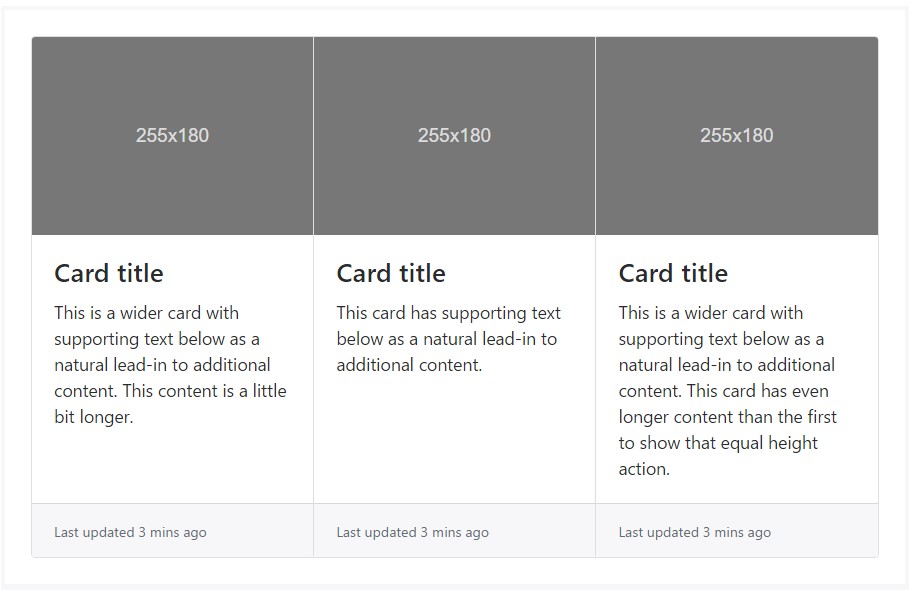
<div class="card-group">
<div class="card">
<div class="img"><img class="card-img-top" src="..." alt="Card image cap"></div>
<div class="card-block">
<h4 class="card-title">Card title</h4>
<p class="card-text">This is a wider card with supporting text below as a natural lead-in to additional content. This content is a little bit longer.</p>
</div>
<div class="card-footer">
<small class="text-muted">Last updated 3 mins ago</small>
</div>
</div>
<div class="card">
<div class="img"><img class="card-img-top" src="..." alt="Card image cap"></div>
<div class="card-block">
<h4 class="card-title">Card title</h4>
<p class="card-text">This card has supporting text below as a natural lead-in to additional content.</p>
</div>
<div class="card-footer">
<small class="text-muted">Last updated 3 mins ago</small>
</div>
</div>
<div class="card">
<div class="img"><img class="card-img-top" src="..." alt="Card image cap"></div>
<div class="card-block">
<h4 class="card-title">Card title</h4>
<p class="card-text">This is a wider card with supporting text below as a natural lead-in to additional content. This card has even longer content than the first to show that equal height action.</p>
</div>
<div class="card-footer">
<small class="text-muted">Last updated 3 mins ago</small>
</div>
</div>
</div>Card decks
Need a set of equivalent width and height cards that aren't affixed to one another? Utilize card decks.

<div class="card-deck">
<div class="card">
<div class="img"><img class="card-img-top" src="..." alt="Card image cap"></div>
<div class="card-block">
<h4 class="card-title">Card title</h4>
<p class="card-text">This is a longer card with supporting text below as a natural lead-in to additional content. This content is a little bit longer.</p>
<p class="card-text"><small class="text-muted">Last updated 3 mins ago</small></p>
</div>
</div>
<div class="card">
<div class="img"><img class="card-img-top" src="..." alt="Card image cap"></div>
<div class="card-block">
<h4 class="card-title">Card title</h4>
<p class="card-text">This card has supporting text below as a natural lead-in to additional content.</p>
<p class="card-text"><small class="text-muted">Last updated 3 mins ago</small></p>
</div>
</div>
<div class="card">
<div class="img"><img class="card-img-top" src="..." alt="Card image cap"></div>
<div class="card-block">
<h4 class="card-title">Card title</h4>
<p class="card-text">This is a wider card with supporting text below as a natural lead-in to additional content. This card has even longer content than the first to show that equal height action.</p>
<p class="card-text"><small class="text-muted">Last updated 3 mins ago</small></p>
</div>
</div>
</div>Just like with card groups, card footers in decks are going to automatically line up.
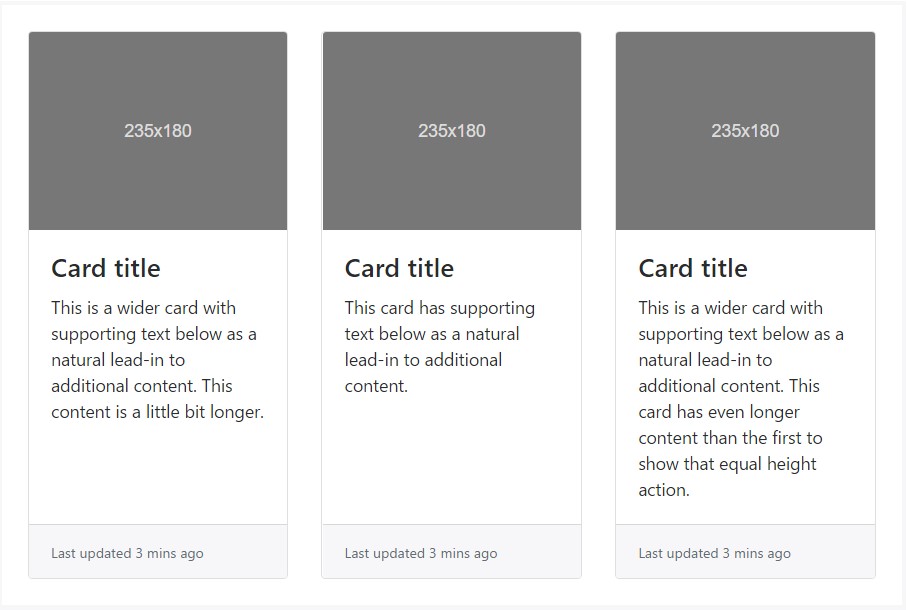
<div class="card-deck">
<div class="card">
<div class="img"><img class="card-img-top" src="..." alt="Card image cap"></div>
<div class="card-block">
<h4 class="card-title">Card title</h4>
<p class="card-text">This is a wider card with supporting text below as a natural lead-in to additional content. This content is a little bit longer.</p>
</div>
<div class="card-footer">
<small class="text-muted">Last updated 3 mins ago</small>
</div>
</div>
<div class="card">
<div class="img"><img class="card-img-top" src="..." alt="Card image cap"></div>
<div class="card-block">
<h4 class="card-title">Card title</h4>
<p class="card-text">This card has supporting text below as a natural lead-in to additional content.</p>
</div>
<div class="card-footer">
<small class="text-muted">Last updated 3 mins ago</small>
</div>
</div>
<div class="card">
<div class="img"><img class="card-img-top" src="..." alt="Card image cap"></div>
<div class="card-block">
<h4 class="card-title">Card title</h4>
<p class="card-text">This is a wider card with supporting text below as a natural lead-in to additional content. This card has even longer content than the first to show that equal height action.</p>
</div>
<div class="card-footer">
<small class="text-muted">Last updated 3 mins ago</small>
</div>
</div>
</div>Card columns
Cards may be arranged into Masonry-like columns with just CSS by putting them in .card-columns. Cards are developed with CSS column properties instead of flexbox for simpler positioning. Cards are ordered from top to bottom and left to right.
Carry on! Your mileage with card columns may differ. To prevent cards breaking across columns, set them to display: inline-block as column-break-inside: avoid isn't a bulletproof solution yet.
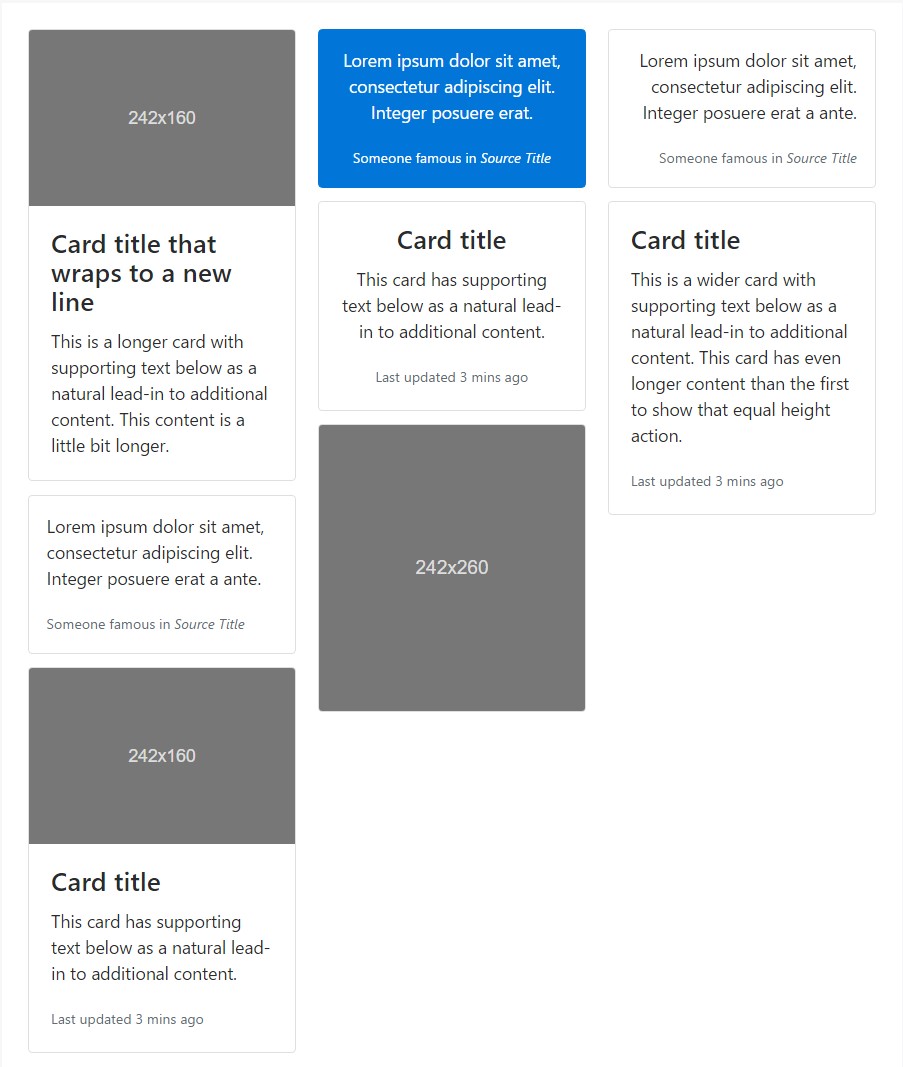
<div class="card-columns">
<div class="card">
<div class="img"><img class="card-img-top img-fluid" src="..." alt="Card image cap"></div>
<div class="card-block">
<h4 class="card-title">Card title that wraps to a new line</h4>
<p class="card-text">This is a longer card with supporting text below as a natural lead-in to additional content. This content is a little bit longer.</p>
</div>
</div>
<div class="card p-3">
<blockquote class="card-block card-blockquote">
<p>Lorem ipsum dolor sit amet, consectetur adipiscing elit. Integer posuere erat a ante.</p>
<footer>
<small class="text-muted">
Someone famous in <cite title="Source Title">Source Title</cite>
</small>
</footer>
</blockquote>
</div>
<div class="card">
<div class="img"><img class="card-img-top img-fluid" src="..." alt="Card image cap"></div>
<div class="card-block">
<h4 class="card-title">Card title</h4>
<p class="card-text">This card has supporting text below as a natural lead-in to additional content.</p>
<p class="card-text"><small class="text-muted">Last updated 3 mins ago</small></p>
</div>
</div>
<div class="card card-inverse card-primary p-3 text-center">
<blockquote class="card-blockquote">
<p>Lorem ipsum dolor sit amet, consectetur adipiscing elit. Integer posuere erat.</p>
<footer>
<small>
Someone famous in <cite title="Source Title">Source Title</cite>
</small>
</footer>
</blockquote>
</div>
<div class="card text-center">
<div class="card-block">
<h4 class="card-title">Card title</h4>
<p class="card-text">This card has supporting text below as a natural lead-in to additional content.</p>
<p class="card-text"><small class="text-muted">Last updated 3 mins ago</small></p>
</div>
</div>
<div class="card">
<div class="img"><img class="card-img img-fluid" src="..." alt="Card image"></div>
</div>
<div class="card p-3 text-right">
<blockquote class="card-blockquote">
<p>Lorem ipsum dolor sit amet, consectetur adipiscing elit. Integer posuere erat a ante.</p>
<footer>
<small class="text-muted">
Someone famous in <cite title="Source Title">Source Title</cite>
</small>
</footer>
</blockquote>
</div>
<div class="card">
<div class="card-block">
<h4 class="card-title">Card title</h4>
<p class="card-text">This is a wider card with supporting text below as a natural lead-in to additional content. This card has even longer content than the first to show that equal height action.</p>
<p class="card-text"><small class="text-muted">Last updated 3 mins ago</small></p>
</div>
</div>
</div>Card columns may additionally be extended and also customized with some extra code. Revealed listed below is an extension of the .card-columns course making use of the very same CSS-- CSS columns-- to generate a collection of receptive tiers for altering the number of columns.
.card-columns
@include media-breakpoint-only(lg)
column-count: 4;
@include media-breakpoint-only(xl)
column-count: 5;Final thoughts
Basically this is the way the bright new to Bootstrap 4 card part becomes simply set up. As always aiming for ease and simplicity the new Bootstrap version combines the performance of several sections into a singular and powerful one. Right now you need to pick up the features you need to be outlined in some cards.
Check several video training regarding Bootstrap Panel Group:
Related topics:
Bootstrap Panel-Cards: formal information
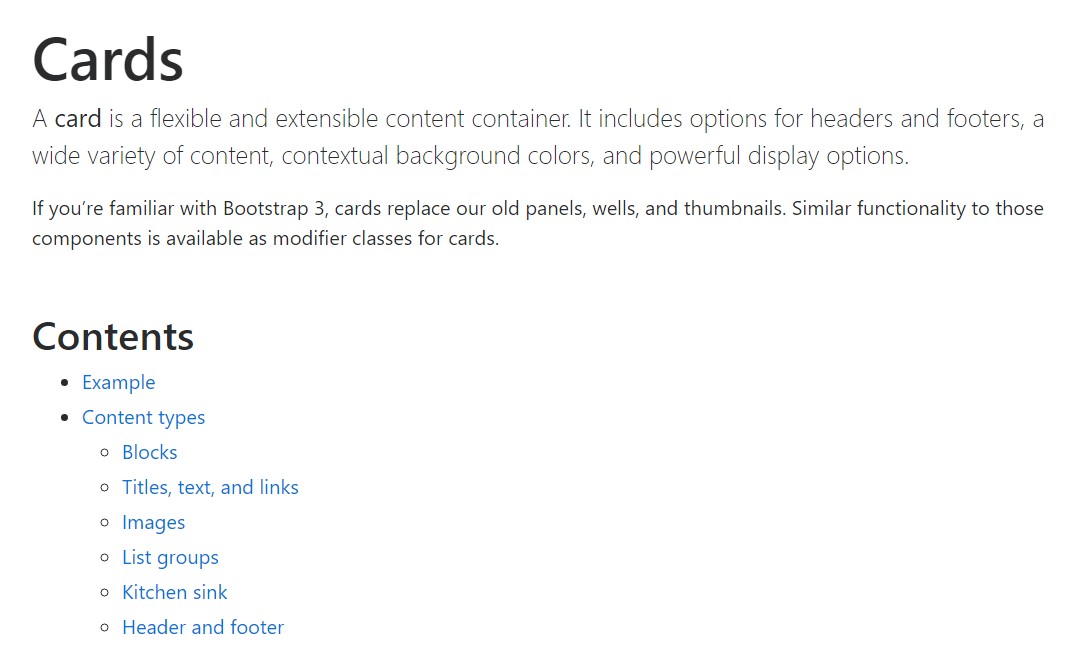
Insights on precisely how can we create Bootstrap 4 cards just the exact same tallness?
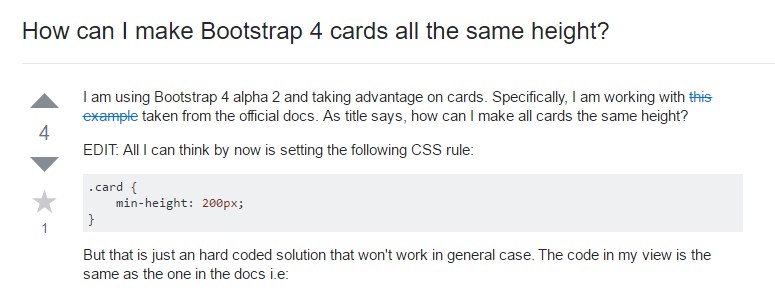
Needing past panel look for cards
